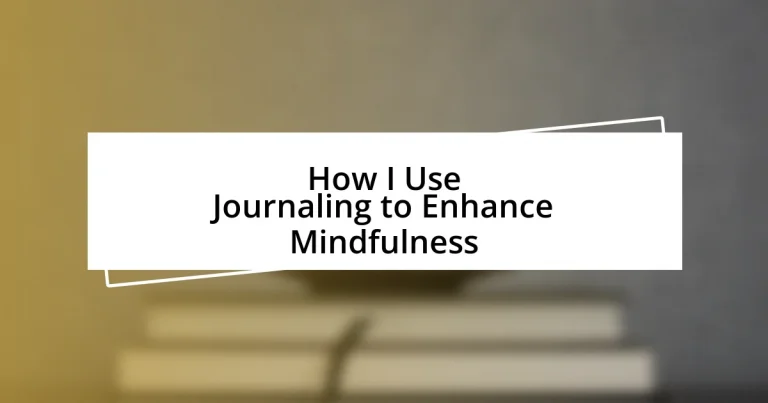Key takeaways:
- Journaling enhances mindfulness by fostering self-awareness, emotional release, and clarity of thoughts, allowing for deeper understanding and acceptance of one’s feelings.
- Effective journaling techniques, such as stream-of-consciousness writing and mindfulness prompts, motivate deeper reflection and exploration of emotions.
- Overcoming challenges like self-criticism and the feeling of busyness can be achieved by embracing imperfection, prioritizing brief entries, and recognizing the value of all experiences in the mindfulness journey.
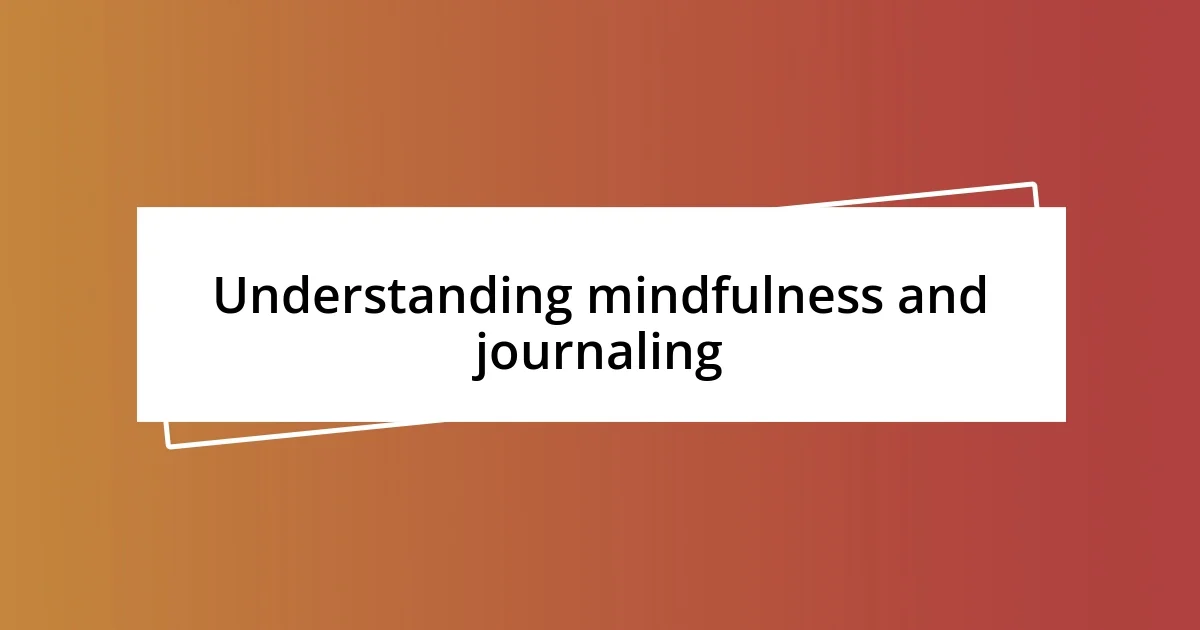
Understanding mindfulness and journaling
Mindfulness, at its core, is about being present in the moment and embracing our thoughts and feelings without judgment. I remember the first time I truly felt present while journaling; it was as if the chaos around me faded away, and I could finally hear my own thoughts clearly. In that stillness, I began to appreciate the subtle emotions that often get drowned out in my busy life.
Journaling complements mindfulness beautifully by providing a structured space to explore and express what we are experiencing. Have you ever written down a thought only to discover layers beneath the surface? I have, and it’s like peeling back the skin of an onion—each layer revealing something insightful about my feelings or stressors that I didn’t recognize before. This act of reflection transforms fleeting thoughts into tangible words, allowing for deeper understanding and acceptance.
When I put pen to paper, I often find that the act itself brings a sense of calm. It’s as if in those quiet moments, I’m having a heart-to-heart conversation with myself. I ask myself questions like, “What am I truly feeling right now?” or “Why did that situation affect me so deeply?” Writing down the answers has been a pathway to clarity and peace, strengthening my mindfulness practice while nurturing my emotional well-being.
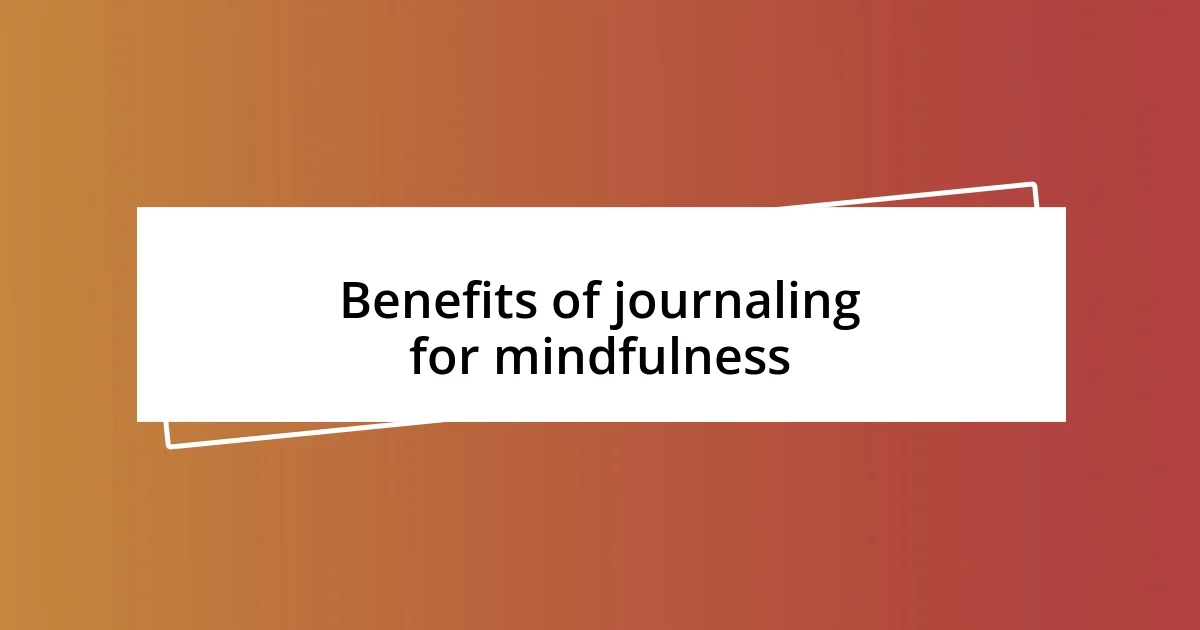
Benefits of journaling for mindfulness
Journaling has transformed my mindfulness journey in unexpected ways. Whenever I sit down to write, I find that it not only grounds me but also opens up pathways to insights that I hadn’t anticipated. For example, one evening, while reflecting on a particularly challenging day, I discovered that my racing thoughts about work were masking deeper feelings of inadequacy. This realization prompted me to explore those feelings further through my writing, leading to a healing process that enhanced my awareness and acceptance of myself.
The benefits of journaling for mindfulness can be profound. Here’s what I’ve found:
- Enhanced self-awareness: Writing about my thoughts and feelings helps me recognize patterns in my behavior that I might otherwise overlook.
- Emotional release: Journaling provides an outlet for processing overwhelming emotions, allowing me to confront them instead of bottling them up.
- Clarification of thoughts: Putting my thoughts on paper often reveals clarity where confusion once reigned, guiding my decisions and reactions.
- Stress reduction: The simple act of writing tends to alleviate anxiety, allowing me to return to the present moment with a calmer mindset.
- Cultivation of gratitude: I find that reflecting on positive experiences in my journal fosters a greater appreciation for the small things in life, enhancing my overall mindfulness practice.
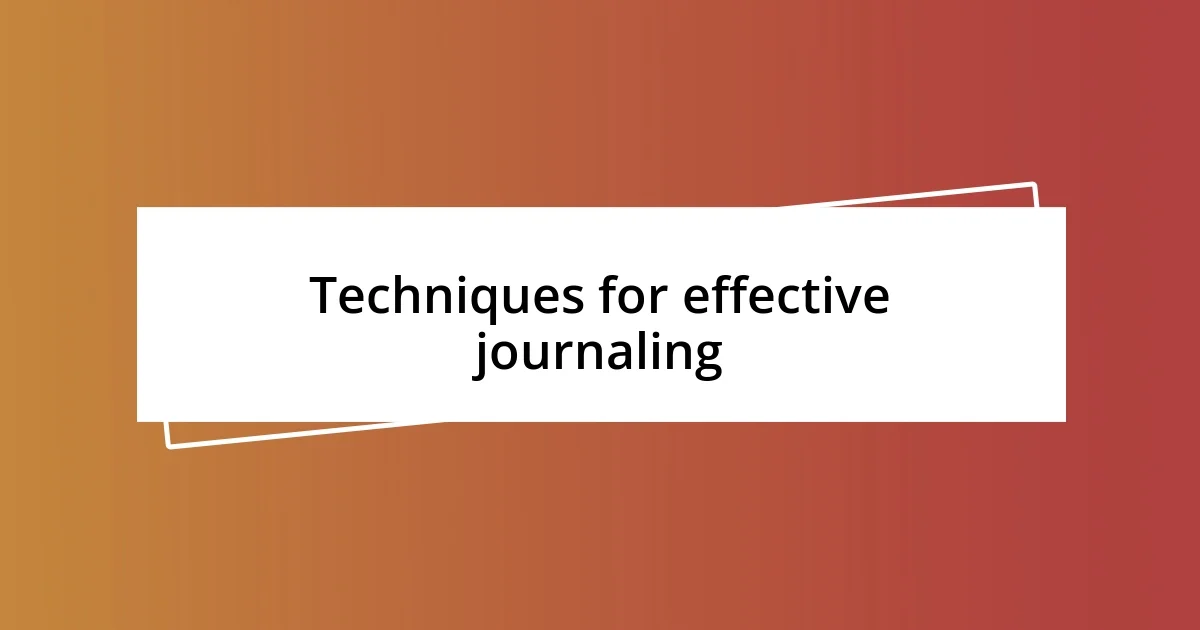
Techniques for effective journaling
Using effective techniques for journaling can significantly enhance your mindfulness practice. One approach I’ve found particularly beneficial is stream-of-consciousness writing. When I dedicate a few minutes each day to let my thoughts flow freely onto the page, it feels liberating. There’s something magical about unfiltered expression—it allows me to dive deep into my subconscious, revealing hidden concerns and thoughts that I might not even be aware of.
Another technique worth trying is thematic journaling, where I focus on a specific topic, like gratitude or emotional triggers. For example, I once committed to writing about things I’m grateful for each evening. This not only transformed my perspective on the day but also trained my mind to seek out positive moments. It’s fascinating how consistently reflecting on gratitude can shift my overall mindset, making even difficult days feel more bearable.
Lastly, I recommend integrating mindfulness prompts into my journaling routine. When I ask myself targeted questions, such as “What feels heavy on my heart today?” it pushes me to think critically about my emotions. I recall once confronting a particularly tough week by exploring why I felt so drained. By dissecting my feelings on paper, I uncovered stressors I hadn’t consciously recognized. This practice of inquiry really strengthens my mindfulness as I learn to engage with my emotions more deeply.
| Technique | Benefits |
|---|---|
| Stream-of-consciousness writing | Encourages free expression, revealing subconscious thoughts. |
| Thematic journaling | Focuses on specific topics, shifting perspectives positively. |
| Mindfulness prompts | Encourages critical thinking about emotions, leading to deeper understanding. |
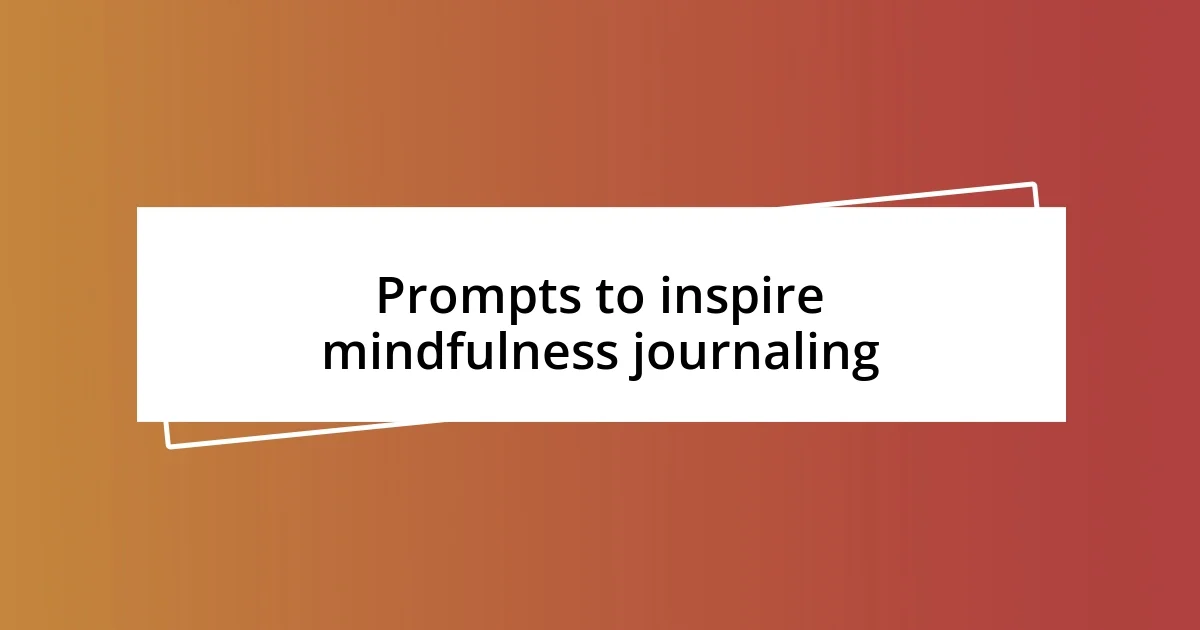
Prompts to inspire mindfulness journaling
One of my favorite mindfulness prompts is the question, “What am I feeling right now?” It’s amazing how one simple inquiry can unlock an entire world of emotions. I remember one evening, sitting with my journal open, I took a moment to check in with myself. I was surprised to find that beneath my initial surface-level frustration about my day, there was a deep sense of sadness that I hadn’t acknowledged. By recognizing that feeling and writing it down, I felt a release that was both liberating and insightful.
Another prompt that has proven valuable is, “What did I learn today?” This question encourages me to reflect on my experiences, no matter how mundane they may seem. I once jotted down a seemingly small realization about a conversation that highlight personal boundaries I didn’t know I needed. After writing, I was struck by how this seemingly trivial insight revealed a lot about my values and helped me set healthier boundaries going forward. It’s these little discoveries that ultimately enhance my mindfulness journey and deepen my self-understanding.
Sometimes, I also challenge myself with prompts like, “What moments brought me joy today?” While it sounds simple, I find myself pausing to appreciate the fleeting joys I often overlook. On a recent rainy day, I found joy in the sound of raindrops against my window and the warmth of a cup of tea cradled in my hands. Capturing these moments in my journal not only brightens my day but reinforces a culture of gratitude in my life, helping me cultivate a more mindful approach to daily living. Have you ever stopped to notice the small joys that make your heart smile?
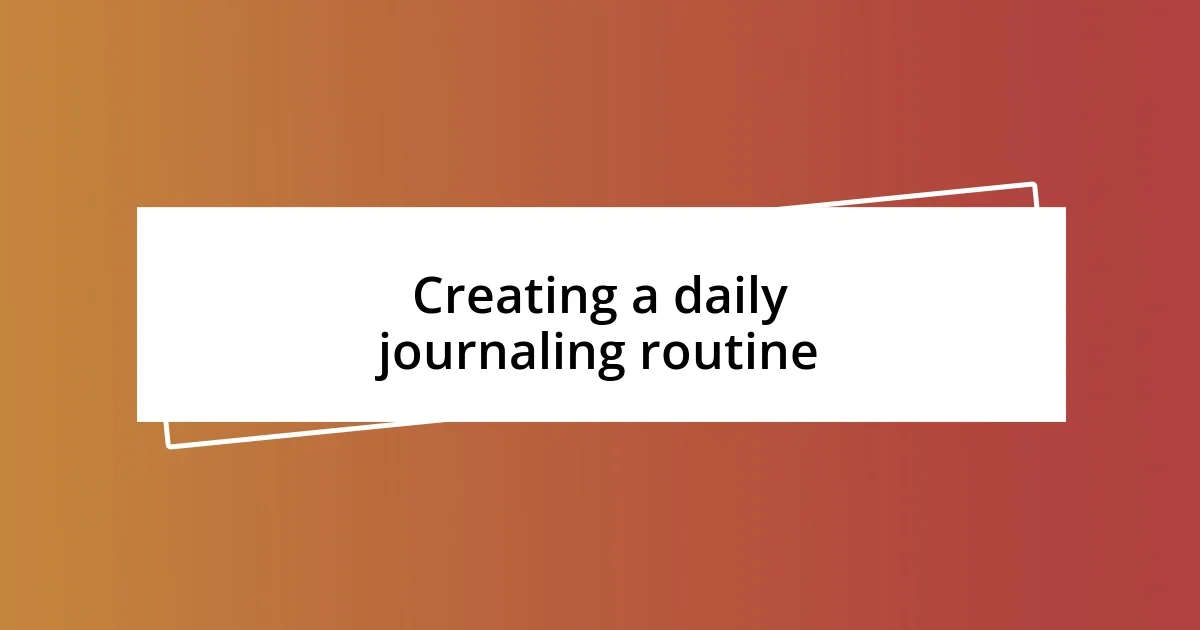
Creating a daily journaling routine
Creating a daily journaling routine is more than just a task; it’s a commitment to myself. I’ve found that designating a specific time each day, like right after my morning coffee, makes it easier to incorporate this practice into my life. Establishing this consistent slot has transformed journaling from something I occasionally remembered to a cherished ritual that sets a positive tone for my day.
I remember a time when I struggled to make journaling a habit. I tried to journal at night but often felt too tired, and my entries were shallow reflections of my day. Then, I shifted to the morning, and it felt like a breath of fresh air. Writing with a fresh mind freed my thoughts and allowed them to flow more freely. Do you think timing affects how deeply you connect with your journaling? I truly believe it does. Finding that ideal moment where you feel energized and inspired can make all the difference.
In addition to timing, I’ve learned to keep my journaling space inviting. A cozy corner with a soft blanket and my favorite pen makes me excited to sit down and reflect. I even have a little playlist of calm tunes that help set the mood. This cozy setup not only boosts my motivation but also creates an inviting atmosphere for introspection. Have you ever noticed how your environment can influence your creativity? For me, it’s all about crafting a space where I can feel at ease and grounded as I explore my thoughts.
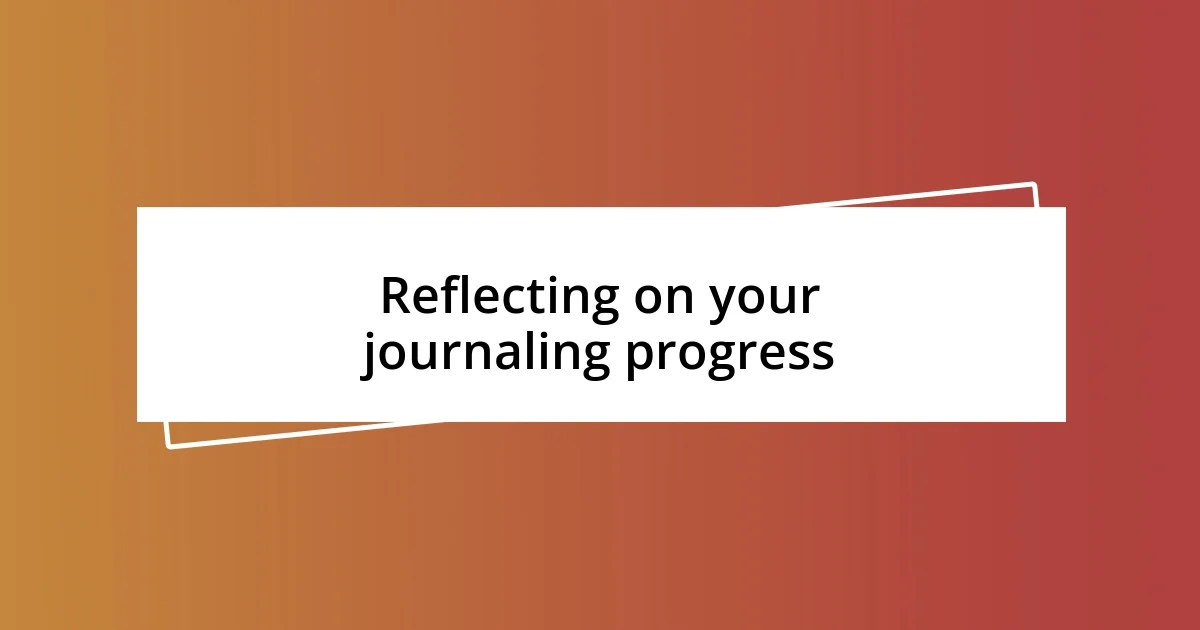
Reflecting on your journaling progress
Reflecting on my journaling progress allows me to recognize just how far I’ve come on my mindfulness journey. I distinctly recall one day flipping through old entries, where I documented my chaotic thoughts filled with anxiety and uncertainty. In contrast, my recent pages are filled with clarity and intentionality, and this shift has instilled a powerful sense of gratitude in me.
One particular entry stands out—there was a time when I felt overwhelmed, and writing felt like an uphill battle. Now, I notice how my entries often explore deeper layers of emotions, helping me process feelings more effectively. It’s fascinating to witness this growth; do you ever find it enlightening to look back at your own reflections? I often feel a wave of pride in my progress, realizing that journaling has genuinely transformed my perspective.
Moreover, reflecting on my experiences encourages me to set new intentions for my journaling practice. There was a period when I focused solely on challenges, but I’ve learned that balancing these with moments of joy enhances my mindfulness. Now, I ask myself, “How can I celebrate my wins, no matter how small?” This approach not only enriches my journaling experience but also fosters a more optimistic outlook on life, which I believe is essential for anyone striving for mindfulness.
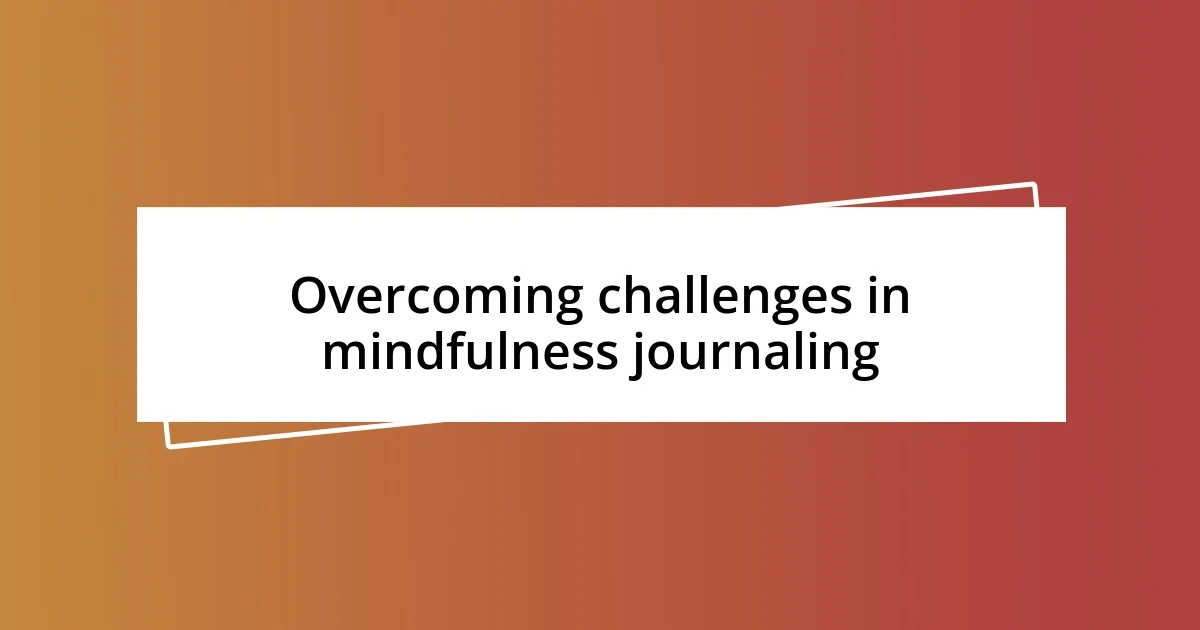
Overcoming challenges in mindfulness journaling
Some challenges in mindfulness journaling can stem from self-criticism. I remember a time when I would read my entries and find myself questioning my thoughts. “Is this even worth writing down?” I would ask. This second-guessing stifled my ability to be open and honest with myself. I discovered that approaching my entries with kindness, almost like a supportive friend, allows me to truly express what I feel without judgment. Have you ever felt that pressure to write perfectly? Embracing imperfection can be very liberating.
Another hurdle I faced was the feeling of being ‘too busy’ to journal meaningfully. Life can get hectic, can’t it? I once thought if I couldn’t write long entries, I shouldn’t bother at all. But then I realized that even a few lines could capture my thoughts, making it all about quality over quantity. I started dedicating just five minutes in my day, and those small sessions often turned into longer reflections. Has a quick moment of mindfulness ever changed your perspective for the day? For me, the power of brevity was eye-opening.
Lastly, I often grapple with the fear that my writing might not be profound or insightful. Looking back, I used to think that my daily experiences weren’t ‘important’ enough for journaling. I later understood that every feeling, no matter how trivial it seemed, contributed to my broader mindfulness journey. Even a bad day or a simple joy can hold gems of understanding. I wonder, have you unlocked any insights from ordinary moments in your life? In my experience, it’s those little treasures that often lead to the most significant breakthroughs.











